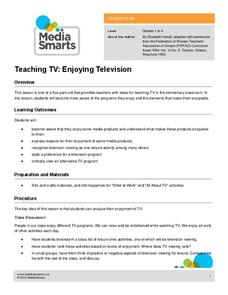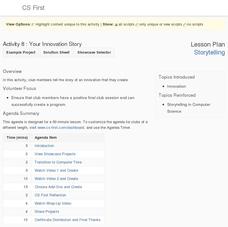US Institute of Peace
Responding to Conflict: Nonverbal Communication
What does your posture say about you? How can it affect the outcome of conflict resolution or negotiation? Show scholars the importance of nonverbal communication during the sixth in a series of 15 peacebuilding lessons. Learners work...
The New York Times
Writing to Explain: Creating How-To Scripts and Demonstrations
Excuse me, can you give me directions? Scholars examine and practice technical writing to increase their ability to write directions. They participate in discussion, watch videos, and complete an assignment to create their own directions.
Teach Engineering
Circuits
Don't know how to make the initial connection on electric circuits? This lesson provides the background to present the introductory vocabulary to learning about electric circuits. It is organized in a meaningful progression with an...
Newseum
The Medium Shapes the Message
Where do you get your news? Have learners examine four different publications and decide which one they would choose to read on their own time. The resource includes a list of publication types to supply and a worksheet for groups...
West Contra Costa Unified School District
Correlation and Line of Best Fit
Computers are useful for more than just surfing the Internet. Pupils first investigate scatter plots and estimate correlation coefficients. Next, they use Microsoft Excel to create scatter plots and determine correlation...
Bowland
Water Availability
Just how scarce is water in different parts of the world? Through these water lessons, young data analysts use provided data to investigate the scarcity of water in countries of the Middle East and Africa. They use ratios and rates to...
Curated OER
World War II - Memory Book
Eighth graders read about and reflect upon a variety of events that occurred during World War II. They conduct research on the Holocaust and Anne Frank's life, the attack on Pearl Harbor, American life during this time and the...
PBS
Stories of Painkiller Addiction: Prescription Drug Abuse Awareness Campaign
The I-STOP law was designed to regulate the distribution and tracking of prescription drugs. After reading an article about its signing and implementation, middle and high schoolers work together to come up with their own ideas for an...
Media Smarts
Teaching TV: Enjoying Television
What makes a TV program enjoyable? As an introduction to media analysis, kids identify their favorite programs and the elements they find engaging.
Code.org
Events Unplugged
Introduce event-driven programming. Young computer scientists learn the meaning of event-driven programming and how it is different from previous styles of programming. They play a card game to simulate the challenges that occur in this...
PBS
Stories of Painkiller Addiction: Commitment to Recovery
Recovery from substance addiction is an ongoing process. The final lesson in a series about painkiller abuse and addiction prompts learners to research various recovery options before writing a short story about a character who is going...
PBS
Family History: Treasure Troves
It's time for show and tell! Scholars investigate historical artifacts to determine what secrets they reveal about the time periods they represent. They then research their own personal artifacts, as well as those from World War I.
Social Media Toolbox
Twitter Time
Tweet all about it! Junior journalists explore the Twittersphere to determine its effectiveness as a news broadcasting tool in the 12th installment of the 16-part Social Media Toolbox. Participants follow and record their observations of...
Perkins School for the Blind
Bagging Groceries
Bagging groceries is a skill that can help learners with visual impairments understand organizing, problem solving, and weight discrimination. In addition, it is also a wonderful job skill. Help learners as they determine how to bag...
Virginia Department of Education
Exponents and Radicals
What is that fraction doing as an exponent? Fun math games prompt learners to practice evaluating radical expressions and expressions containing rational exponents, both in groups and individually.
Teach Engineering
Coordinates and the Cartesian Plane
The plot thickens to get a functional understanding. After a short review of plotting points on the coordinate plane, class members learn the difference between functions and relations in the second lesson in a series of nine. They...
Teach Engineering
Solar Angles and Tracking Systems
The sun will continue to rise in the east and set in the west, no matter what. The first lesson in a series of eight introduces the class to solar angles. It makes connections between a person's latitude and the angle of position of the...
Google
Storytelling: Your Innovation Story
Explore a trailblazing way to talk about innovation. Using the Scratch coding program, young computer scientists create innovations and write stories to accompany them. They include some of the add-ons they mastered throughout the unit.
Avi Writer
City of Orphans: Teaching Guide
"Amazing things happen" in Avi's City of Orphans, and the suggestions in this teacher's resource will guide readers through through the many stories of the different characters living in the tenements of 1893 New York.
US National Library of Medicine
Science and Society: Preventing the Spread of Disease
Looking for a valuable resource on the spread of infectious diseases? Here is a lesson in which pupils simulate the spread of diseases and learn about how to prevent them from spreading. Class members read case studies about diseases,...
Cornell University
Wasps and Ladybugs
Can a good bug ever become a bad bug? An elementary entomology resource explores what to do when too many ladybugs or too many bees are in your home and can become a problem.
California Mathematics Project
Reflections
Reflections are the geometric mirror. Pupils explore this concept as they discover the properties of reflections. They focus on the coordinates of the reflections and look for patterns. This is the third lesson in a seven-part series.
Virginia Department of Education
Three Types of Rocks
Rock out with the second installment of a five-part series on earth materials and processes. Your budding geologists make observations of given rock samples and posit classification systems for rocks. They then learn about the...
Chicago Botanic Garden
Weather or Not
What is the difference between weather and climate? This is the focus question of a activity that takes a deeper look at how weather data helps determine climate in a region. Using weather and climate cards, students decide...

























